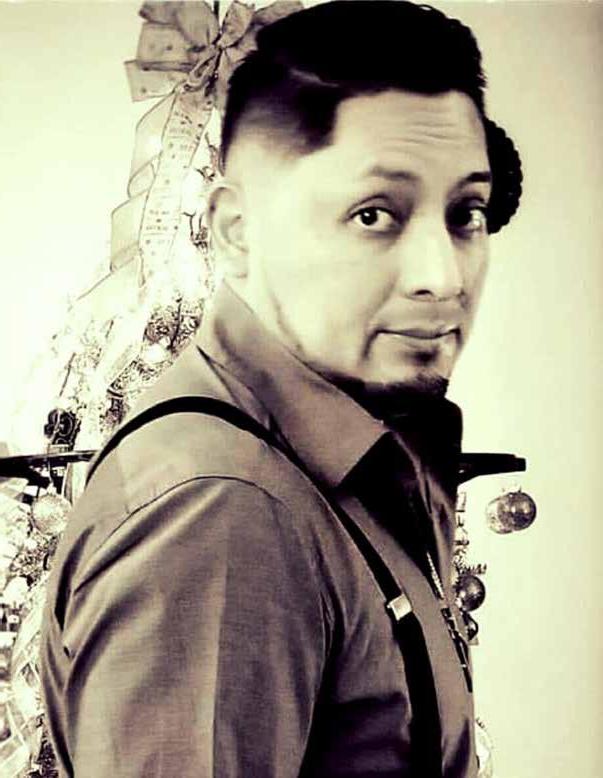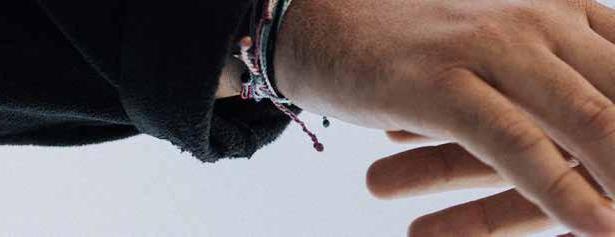
15 minute read
Profiles
A Father, A Student, Profiles A Leader
By Estefano Torres | Staff Writer
Advertisement
Losing his job was the last thing my father, Jorge Torres, needed. He was entering the first stages of becoming a father. The year was 2001 and now, for the majority of his daily routine, he was met with that familiar scent of freshly baked pizza.
One would normally be filled with excitement, however when delivering pizzas had become one of his primary ways of barely making a living, the aroma would devolve into a sickening stench of sticky cheese and dairy. Even if he took on two jobs in pizza delivery AND in UPS delivery, it was his wife and parents who he relied on for money and for paying bills.
“This was the biggest recession I ever faced in my life,” Jorge admits.
As he sat down with his wife, ready to discuss moving to Puerto Rico to work for his father-in-law, Jorge froze and observed every corner of his home. He and his family had worked hard to finally purchase this house. Together, they had brought in the green and brown couches, hardwood tables, and especially, assembled his newborn son’s royal blue crib. He did not want to simply give up. “There was a drive I had within me to provide the best for my son.” He took a moment to himself, which stretched for days, weeks, and then months. His over-confidence and determination began to get the best of him, as usual. This time, for the better.
After countless attempts of applying for higher paying jobs, he would be rejected over and over again. Though these would be hard blows, Jorge would have the greatest of support and affection by his side in the form of his wife and family.
“I guess one thing I did to control stress was to pray,” he says. Every night, he would pray for bigger opportunities and chances to redeem himself to make his loved ones proud. Eventually, after many rejected applications, he would get his chance by working in a medical equipment industry. This job would be short-lived, however, as he would successfully earn a job at ASML - a Dutch semiconductor behemoth - as a temporary worker. Despite the instant loss of all his benefits (such as medical and vacation), Jorge remained confident and took this life-changing risk.
After slowly beginning to make a proper living for his family, Jorge would apply to Housatonic for Spring 2004 to earn his degree in Computer Science. His interests would change as he continued his education. He would gain interest in engineering, earning him a higher position at ASML because of his newfound skill. As he would progress through Housatonic many years later, he would once again change his career interests, this time chasing his degree in Business. After many changes Jorge would go through in his professional and academic life, he would finally go home, greet his
now four children and wife, and share the news of his new promotion as Team Leader at ASML, one of the biggest roles within the globally successful company.
“Because I have changed my career three times, I am able to provide both for my children and go to school,”he added. Such stubbornness and high confidence would truly boost him to immensely impressive heights after all.
My father, Jorge Torres, is still not satisfied with his success and wants more. Being surrounded with nothing but his bed, desk, and laptop, he continues
to excel within Housatonic and ASML, and does not plan on stopping. Jorge now hopes that his story can influence both the future success of his children and everyday HCC members.
“As any student, I was faced with uncertainty and ended up changing my career path three times,” he said.
This is common for many students, and Jorge wishes to let them know that this is all part of the process. In regard to his children, Jorge states, “I want them to be 10 times better than I could ever be.” As he finally settles down for the afternoon, gets comfortable on his couch, turns on his Samsung TV, and opens up his jar of pistachios. It is time to look forward to the many more challenges to come.
Dyslexia and a Dip loma
Being diabetic is not the only challenge HCC student Liz Smith faces on a daily basis. One of the most significant life challenges she has faced has been overcoming her dyslexia. was also a diabetic, that Liz began feeling confident with herself. The idea that someone who had the same disability she did was able to accomplish her goals was comforting to Liz. This teacher taught Liz to accept and
She recalls being diagnosed early on in elementary school. At the time, she did not quite understand what being dyslexic meant or how this label of a learning disability would affect her long term. All she understood was the way she learned was different from her classmates.
Other kids teased her due to the struggles she faced with reading and writing, so much so that she grew to dislike school. When she would read aloud, it fueled emotions of shame, embarrassment, and overwhelming anxiety, as she watched the reaction of her peers and teachers; while she stumbled and stuttered, trying to interpret the words on the page in front of her.
“It was hard, and I felt out of place, I just wanted to have a normal day and no one understood that.” said Liz.
Her school days consisted of being pulled in and out of class in a repetitive reading and writing cycle, which she found frustrating because she just wanted to get it all right the first time around.
It wasn’t until she met her third-grade teacher, who
By Nicole Vezina | Staff Writer
love her differences. Her confidence began to rise, and her grades along with it. “Everything finally clicked,” Liz said. “It was like she was in my mind and knew how it worked better than I did.” This connection she had with this teacher still sticks with her today and is what inspired her journey into teaching. Liz is now attending HCC as an Early Childhood Education major. In class, I would have never been able to tell in class how much effort she had to put into her schooling to get to where she is now. It wasn’t until my interview with her that I realized how hard she had to work to get here. “College was tough at first, so much reading, “ she said. Liz explained the hours she would spend reading and re-reading chapters because nothing made sense. She was reading each individual word, and she understood those words, but when combined in a sentence, it all became a blur. In her mind, everything was jumbled together, and simple words would quickly become foreign when paired with other simple words.

Photo by Green Chameleon on Unsp las hProfiles
Yet, she noted, “It might take me longer to read a chapter than most, and I may not fully comprehend what I read at first, but the extra time I spend rereading information, and using different studying strategies helps me fully understand and grasp what I am learning”
She thought many times about dropping out and just accepting the idea of working a retail job, but she knew she couldn’t make the differences she wanted to only by ringing up customers at a register. Becoming a teacher means more than just educating children to her.
“I want to make a difference, and help shape children’s lives and self-confidence so they can build a positive relationship with school early on,” she said.
She hopes to use her disability and story to influence the success of future young learners. Her idea is that all children learn differently, and instead of forcing children to learn one way, we should focus on individual needs, learn to adapt to these needs and plan lessons that support and engage each child. She wants the children in her class to come in with the mindset that they can accomplish anything, and she is there to support them in any way they need.
As Liz looks towards her graduation in May, she knows that her degree is more than just a fancy piece of paper; it’s her pathway to a fulfilling future.
The Power Of Exercise During The Profiles School Year
By Jack Price | Staff Writer
As a student at HCC, Josh Breitbart has had his troubles in the past. During his life school was never of importance to the young man, who would fall behind in his studies.
His first semester at HCC was no different. While dealing with many personal challenges, he would hardly show up to class.
“I initially only went to college because my parents wanted me to,” he says. Breitbart claims that since he was diagnosed with depression and that he didn’t exactly have the best track record regarding school, that education was a hopeless cause. “I let my past define me,” he said somberly.
Amidst the darkness, a light would show on the horizon for him in a place completely unrelated to school–the local gym. When a fellow student at HCC began to bring Breitbart to the gym, it slowly became his place of solace and a place where he could “decompress and forget about the trials and tribulations of the day.” What he didn’t anticipate though, was that the benefits he reaped in the gym would translate to other areas of his life.
Due to the effort and dedication he put into bettering himself at the gym, how he felt about himself drastically changed.
“My confidence skyrocketed,” he said, since he was finally working on himself, something he had never paid mind to before.
The confidence did not just come because of his newfound muscles and energy, it came also because his hard work at the gym proved to him that he really could accomplish difficult things if he gave himself a chance and put in the work.
Once in a sunken place and once dreading his future, Breitbart finally had hope. It is this hope that resulted in a string of great grades during his most recent semester at HCC.
“I finally feel excited for my future, something I haven’t felt in a while. It’s a beautiful thing,” he exclaimed with an exuberance once nonexistent.
Failing Forward By Guillermo Hernandez | Staff Writer
Kristen Carley, currently an English professor here at Housatonic, had a life-changing “failing forward” moment when she was a college student and was required to take a music theory class.
“I was in an auditorium type of room with 300 students, we have a lecture, and he threw the information on the screen. I have been a successful academic student, a smart student, a strong student, and everyone around me seemed to get it but me,” she said.
She recalls herself falling into a dark hole when she failed the class.
“I didn’t tell anybody, I didn’t tell my parents, or my siblings I just failed,” she adds.
The aftermath of her failure had caused her to stop attending the class altogether. “It made me feel so bad about myself. I wanted to drop it, but I was afraid to tell my parents I was dropping a class. When you don’t get it, you just stop trying, and I stopped trying,” she said.
She demonstrates the importance of embracing discomfort.
“It’s uncomfortable to not do well, it’s uncomfortable to try something new,” she says. “Embrace your discomfort. For me, it was revealed that I had insecurities, I wasn’t perfect, and I didn’t know it all. I was going to let people know that sometimes I didn’t get it.” She was devastated by the failure she endured during that time and what she did next changed her life forever. It became her “mantra,” she says.
Carley, who failed the music theory class, ended up retaking the class the next semester. But she needed to tackle this obstacle with different approaches.
“Before I stepped in day one of that class I found help,” she says. She recalls finding a teacher who at that point was retired.
“She invited me to her home, it was a very quiet space. It was a very safe space for me to ask for help and through her guidance and encouragement before a test, after a test, and doing homework the way she explained it to me unlocked the confusion.” Carley ended up with an A in her music theory class. She said she felt happy, not because of the A or 4.0. She was happy because she went through failing to excellence.
At the beginning of the semester of every class, she starts with “Go to class, Do the work, Ask for help. That is how you are going to succeed in my class.” Those words stood with me and changed my life as a student in her class.
“Those nine words that I give to my students, that’s my mantra. I developed it after knowing I had to change things So, what did I do to get out of it [the dark hole] those nine words are not only how I got through it but how I thrive on it,” she adds.
Studies show, she said, that minority students don’t ask for help because they see it as a weakness. “I have seen it too and as a woman, I’m a minority right? I had to be perfect. I was the first one in my family to go to college. I had to do this.”
She says she never felt entitled to ask for help, but she learned she should when she didn’t understand something.
“It became how I succeeded in college and Graduate school and I feel like it has been a driving force in how I teach,” she says.
Failing is a scary situation. Once you experience the taste of failure, all of your insecurities come in at once. We all strive to be perfect, to do the good thing, to succeed. Nobody talks about how failure inflames your thoughts and pushes you to give up.
If we start using the failing forward method our lives will be changed. We will no longer be holding on to that failure but we will strive to succeed. Kristen Carley did not let that failure overcome her. Instead, she found a solution and that solution changed her whole life.
Take that Helping Hand; It’ll Lead the Way to Victory
Profiles
By Vasthiestefany Flores | Staff Writer
We’ve all experienced challenging and difficult moments. It very well might be the passing of somebody we love or an issue we have to endure with nobody to help. Some simply go through the motions quietly, not allowing anybody to engage and come in. What’s more, even while we do that, we realize that isn’t the best or healthiest reaction. However, those situations don’t define us; it’s how one rises from their lows to succeed at their highs that does.
A true story of inspiration and determination comes from HCC student Liana Ferreira, who is majoring in graphic design and is currently taking six classes. While she is busy achieving her goals and dreams, it has not always been so easy.
She describes the moment of fear and panic when her coworker and friend fell into two brain aneurysms by saying, “I did not know what to do. In that situation, I lost all train of thought I ever learned. I stayed by her side even when the paramedics came; I stayed close by. When it was time to take her away, I did not want to leave her, but I knew I would not be allowed to go.” A rush of emotions can overpower someone as it did to Liana at that moment, yet that wasn’t the most challenging part.
Her friend fell into a coma, and the family decided to pull her life support. Weeks later, Liana suffered severe flashbacks to her friend’s death, along with negative feelings of doubt and self-blame. She was pushing people away and believed being lonely would solve the issue, but it didn’t.
“For the longest time I blamed myself for what happened that day. I didn’t notice that something changed about me that day,” she said. Her entire aspect and way of living changed completely because of that tragic event that she had to face.
That was a very low point for Liana. She felt the bruises and hardships were taking a toll on how she even associated with people. To this day, it affects Liana to get close to people, she said.
“ I am still afraid to get close to people and too shy to try and make friends. It feels better to be alone when you are like this. The truth is it’s not. You become stuck in this world that replays that event over and over until it eats you from the inside out.” she said.

The days were getting longer and tougher for every living aspect that Liana had to endure. She felt like there was no escape out, but it was not the end.
One day, Liana thought thoroughly of what she wanted to accomplish in life; to feel free, focused, and motivated to get an education. What helped her grow and ultimately succeed? A helping hand. Yes, as simple as it sounds, it takes courage to open up and grab that hand. Liana had to break away from her fear of losing those she loves. There had to be a starting point that would soon guide her to joyous heights.
Liana took a psychology class and was diagnosed with having PTSD (Post Traumatic Stress Disorder). She wanted to learn more about what it was and did an assignment on it. This assignment helped her to understand better the reasons behind those negative feelings and how to overcome them.
She said she wants people to know that they are not alone. “If I learned anything from that day, it was, no matter how insignificant pain in the body is, get checked. Not everyone is strong enough to go through what I did without help. Sometimes you need a helping hand, so when one is given to you, just grab it,” she added.
Liana hopes her story can help others reach out and find the appropriate help they need to take the necessary steps to move forward. It is a process, but anything is possible to achieve your dreams.
Photo by Austin Kehmeier on Unsplash




